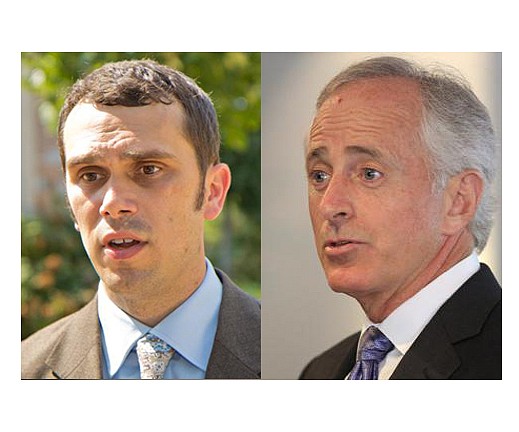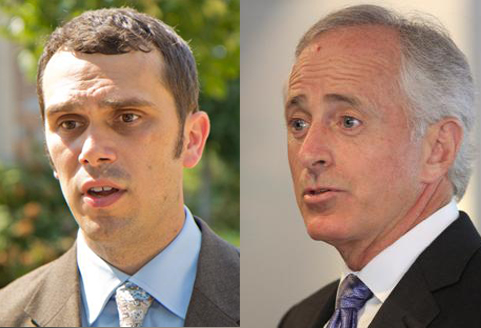Bob Corker confident of re-election bid
Friday, January 1, 1904
Sen. Bob Corker (R)Age: 60Education: University of TennesseeProfessional: Former owner of Bencor, a construction company; state finance commissioner (1995-1996); owner of commercial real estate firm The Corker Group (1982-2006).Political: Ran unsuccessfully for U.S. Senate (1994); Chattanooga mayor (2001-2005); elected to U.S. Senate (2006) and serves on Senate Banking and Foreign Relations committees.Mark Clayton (D)Age: 36Education: Pensacola Christian CollegeProfessional: Works as mover and floor layer; previously sold insurance and annuity policies.Political: Volunteer vice president with Public Advocate of the United States, a conservative family-values group. Worked with father, Jack Clayton, on Christian school and religious liberty advocacy.
NASHVILLE - Six years ago this month, Bob Corker was huddling in a limousine in Memphis with President George W. Bush and Bush adviser Karl Rover, glumly eyeing polling showing Corker losing the U.S. Senate race to Democrat Harold Ford.
"We got in this long, black limo, and we all knew I was going to lose the race, and you talk about a depressing ride," Corker recalled last week to Nashville Chamber of Commerce members.
But instead, the Republican former Chattanooga mayor eked out a 51-48 percent victory over Ford in Tennessee's most expensive Senate race on record -- the two candidates raised more than $33 million all told, according to the Federal Election Commission.
Fast-forward to October 2012 and Corker is merrily chugging along, his re-election campaign almost on autopilot.
His Democratic opponent is Mark Clayton, 36, whose candidacy has been disavowed by state Democratic Party Chairman Chip Forrester for what Forrester called his "extreme" views on gay issues such as same-sex marriage.
So how confident is Corker about this election?
Well, right now he's stumping not through Tennessee but the Middle East, on a Senate fact-finding trip. He hinted last week the trip was tied to the Sept. 11 attack on the U.S. Consulate in Benghazi, Libya, that left Ambassador Chris Stevens and three other Americans dead.
Asked whether he's taking re-election for granted, Corker told reporters, "I have said from Day 1 that my service in the Senate was going to be my campaign, and almost all the things I've been doing are relative to my service in the Senate."
As a member of the Foreign Relations Committee, he said, "I've got responsibilities. ... In spite of the fact we have a big election happening in our country, the rest of the world has not stopped."
He said he is "likely to be the lead Republican on foreign relations issues" in the next Congress.
Clayton couldn't be happier with Corker's decision to go out of the country.
"We're not going to Washington, D.C., to be a special person, fly around to different countries and forget Tennessee," Clayton said. "We couldn't ask him to campaign against himself any better by doing what he's doing. ... He doesn't realize he's posting negative ads for himself."
Declaring he is running the "quintessential grass-roots campaign," Clayton said he is making "practically no-budget commercials" for the Web and contacting voters directly on the Internet.
Lopsided race
Independent observers, however, see Corker on an easy glide toward re-election.
At last count, Corker had $6 million in the bank. Clayton didn't raise enough to warrant filing a federal campaign finance disclosure, although he expects to file one for the third quarter. Clayton's currently making pitches on his Facebook page for $450 in donations to pay for 20,000 flyers.
The Rothenberg Political Report, which analyzes federal contests, calls Corker's seat "safe." The Cook Political Report, which also handicaps races, calls Tennessee "solid" Republican for Corker.
Jessica Taylor, a senior analyst with Rothenberg, said the Tennessee Senate race isn't on anyone's radar screen.
"I think going way back to the beginning of the [election] cycle, Corker's biggest threat was going to be a primary challenger that never materialized," Taylor said. "And certainly he got even safer when the candidate the Democrats got, the state party has disavowed."
Corker has contributed heavily this season to colleagues and GOP hopefuls, which Taylor sees as a sign of ambition.
"I think Corker's already looking at where he may move into leadership or on a committee," she said.
In his first term, Corker aggressively injected himself into major national issues in areas ranging from the auto industry bailout (he opposed it) to financial services reform and the federal debt crisis.
He ranks No. 3 in seniority on the Senate Banking Committee.
Corker said that no matter who wins the presidency, he thinks Republicans and Democrats will move beyond the current stalemate and start resolving the nation's serious financial problems.
"It's been like watching paint dry over the past two years. We all know what we need to do but we haven't done it," he said.
Clayton's issues
Clayton, who lives in a Nashville suburb, said he used to sell insurance and annuities and has long been involved in socially conservative issues.
He is the volunteer vice president of Public Advocate of the United States, a group that lobbies against same-sex marriage and that has been labeled a hate group by the Southern Poverty Law Center.
The candidate said he's not about hating anyone.
"We are not about marginalizing anybody, including gays, from the democratic process," he said.
Clayton said he rejects "far-left social values" pushed by Democratic "party bosses" like Forrester on same-sex marriage and abortion.
He believes Democrats, independents and Republicans should rally around his less-known stances, such as preserving Medicare and Social Security.
"We need to make sure the Republicans never get a chance to voucherize Medicare or privatize Social Security because if we do it's just going to be another way to steal resources and let America be hanged," Clayton said.
He also wants to push a bipartisan effort to refocus the American economy away from Wall Street financial machinations toward reinvigorating manufacturing and agriculture.
He faults Corker for supporting the bank bailout, saying Washington's moves were "too reactionary." And he thinks Corker spends too much time talking to Wall Street bankers.
Still, the Democratic nominee isn't saying whether he will support Democratic President Barack Obama, Republican Mitt Romney or someone else on Nov. 6.
"I'm just saying we're maintaining our independence," Clayton noted. "We feel in our campaign, we are here to plow the unplowed field."

